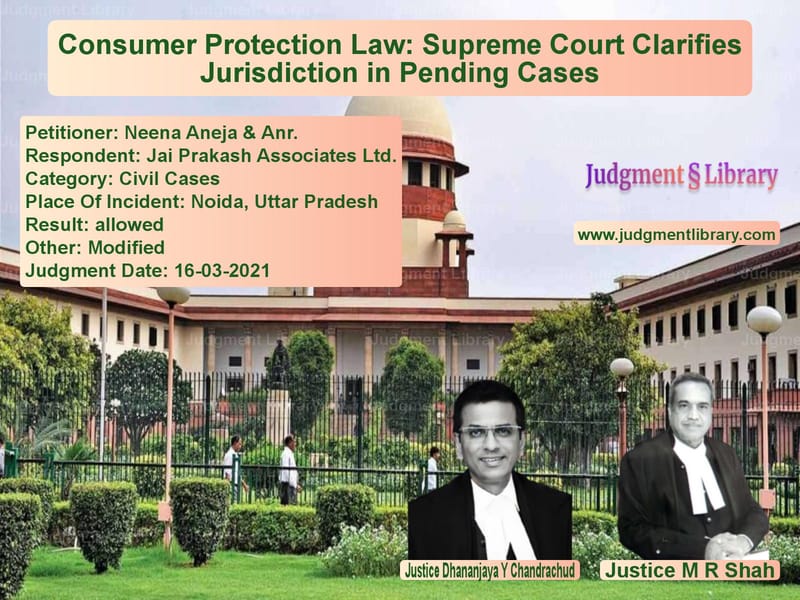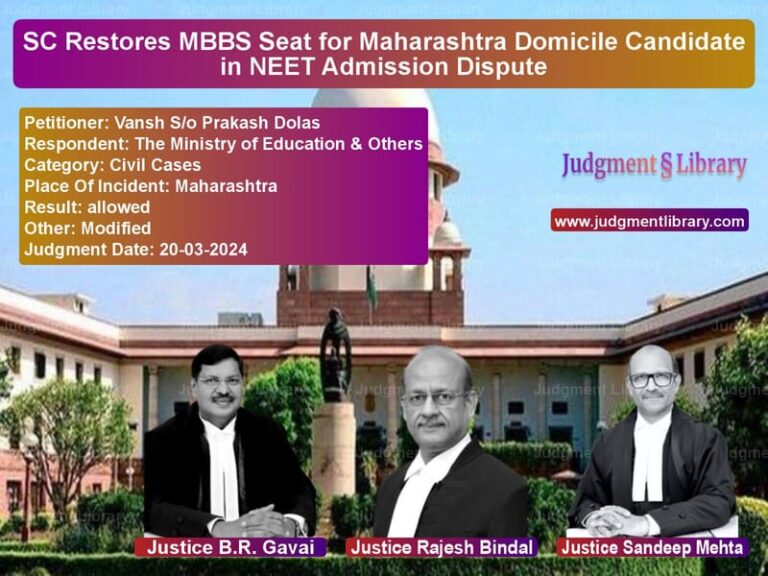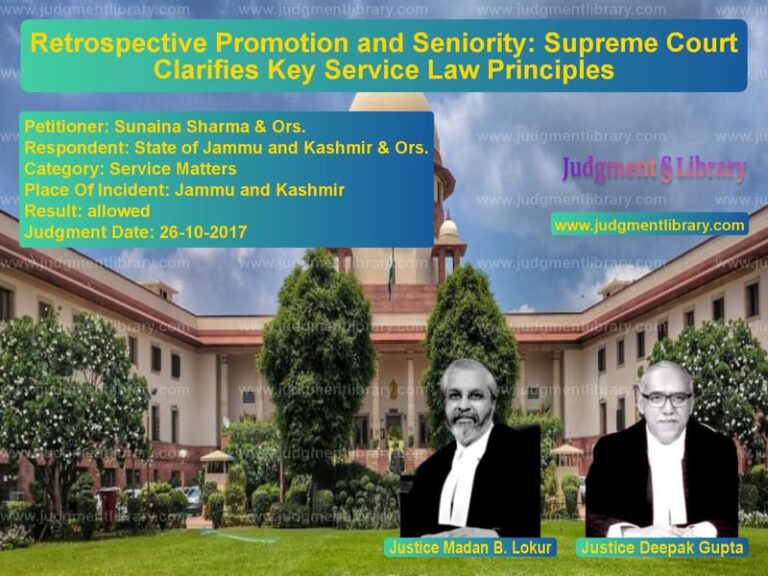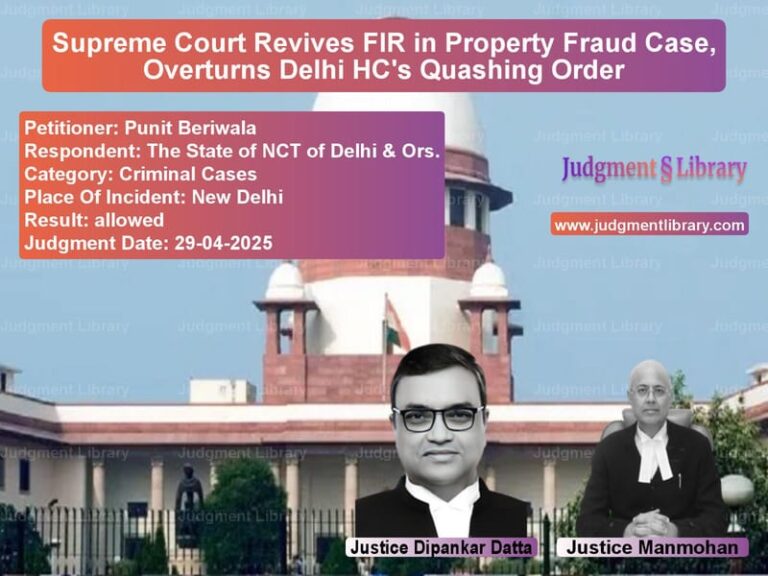Consumer Protection Law: Supreme Court Clarifies Jurisdiction in Pending Cases
The case of Neena Aneja & Anr. vs. Jai Prakash Associates Ltd. is a landmark judgment by the Supreme Court of India that clarifies the application of pecuniary jurisdiction under the Consumer Protection Act, 2019. This case revolved around whether consumer complaints filed under the Consumer Protection Act, 1986 should be transferred to new forums under the Consumer Protection Act, 2019 based on revised pecuniary limits.
The case was filed by the appellants, who had lodged a consumer complaint in 2020 before the National Consumer Disputes Redressal Commission (NCDRC), seeking a refund from the respondent for failure to deliver possession of a residential unit as promised. The complaint was dismissed for want of pecuniary jurisdiction due to changes in the 2019 Act, which raised the NCDRC’s jurisdictional threshold. The appellants challenged this decision, leading to a detailed legal analysis by the Supreme Court.
Background of the Case
The dispute arose from a real estate transaction where the appellants booked a residential unit in a project called KRESCENT Homes at Jaypee Greens, Noida. The total sale consideration was Rs. 56.45 lakhs, out of which the appellants had paid Rs. 53.84 lakhs over the years. When possession was not handed over within the promised 42-month period, they demanded a refund with interest and subsequently filed a consumer complaint before the NCDRC.
The key issues in the case were:
- Whether consumer complaints filed under the 1986 Act should continue under the old law or be transferred to forums under the 2019 Act.
- Whether a change in pecuniary jurisdiction could affect pending cases.
- The role of savings provisions under Section 107 of the 2019 Act and Section 6 of the General Clauses Act.
Legal Issues Raised
1. Applicability of the Consumer Protection Act, 2019
The primary legal question was whether cases filed under the 1986 Act should continue under the same law or be transferred based on the revised pecuniary limits set by the 2019 Act.
2. Rights of Consumers in Pending Cases
The appellants argued that the right to file a consumer complaint before the appropriate forum under the 1986 Act was a vested right, which could not be taken away merely due to changes in jurisdictional thresholds.
3. Interpretation of Section 107 of the 2019 Act
The court examined whether Section 107(2) of the new Act, which saves previous actions taken under the repealed Act, was broad enough to protect pending consumer complaints.
Supreme Court’s Observations
The Supreme Court delivered a detailed ruling analyzing various precedents related to changes in forum and jurisdiction. The key observations were:
- Generally, a change in forum is considered a procedural matter and applies retrospectively unless a contrary intention is shown.
- Section 6 of the General Clauses Act saves pending proceedings unless expressly stated otherwise.
- The absence of any express provision for transferring pending cases under the 2019 Act indicated that Parliament did not intend such transfers.
- Requiring consumers to restart their cases before a different forum would lead to unnecessary hardship, delay, and increased litigation costs.
Final Verdict
The Supreme Court ruled in favor of the appellants and held that:
- Consumer cases filed under the 1986 Act shall continue before the same forum where they were originally instituted, irrespective of the revised pecuniary limits under the 2019 Act.
- The NCDRC’s order dismissing the case for lack of jurisdiction was set aside.
- All pending consumer cases shall be heard and decided by the forum in which they were originally filed.
- The respondent (Jai Prakash Associates Ltd.) was directed to bear the litigation costs, amounting to Rs. 2 lakhs.
Implications of the Judgment
This ruling has significant implications for consumer protection law in India. It establishes the following principles:
- Consumers cannot be forced to refile cases due to changes in jurisdictional thresholds.
- Pending cases must be adjudicated under the law that was in force at the time of filing.
- Statutory savings clauses in repealed laws play a crucial role in protecting vested rights.
- The decision strengthens consumer rights and prevents unnecessary procedural hurdles.
The judgment ensures that consumers who filed complaints before the enactment of the 2019 Act will not be disadvantaged by procedural changes, reinforcing the principle that consumer welfare remains paramount in legal interpretations.
Petitioner Name: Neena Aneja & Anr..Respondent Name: Jai Prakash Associates Ltd..Judgment By: Justice Dhananjaya Y Chandrachud, Justice M R Shah.Place Of Incident: Noida, Uttar Pradesh.Judgment Date: 16-03-2021.
Don’t miss out on the full details! Download the complete judgment in PDF format below and gain valuable insights instantly!
Download Judgment: neena-aneja-&-anr.-vs-jai-prakash-associat-supreme-court-of-india-judgment-dated-16-03-2021.pdf
Directly Download Judgment: Directly download this Judgment
See all petitions in Consumer Rights
See all petitions in Damages and Compensation
See all petitions in Judgment by Dhananjaya Y Chandrachud
See all petitions in Judgment by Mukeshkumar Rasikbhai Shah
See all petitions in allowed
See all petitions in Modified
See all petitions in supreme court of India judgments March 2021
See all petitions in 2021 judgments
See all posts in Civil Cases Category
See all allowed petitions in Civil Cases Category
See all Dismissed petitions in Civil Cases Category
See all partially allowed petitions in Civil Cases Category







